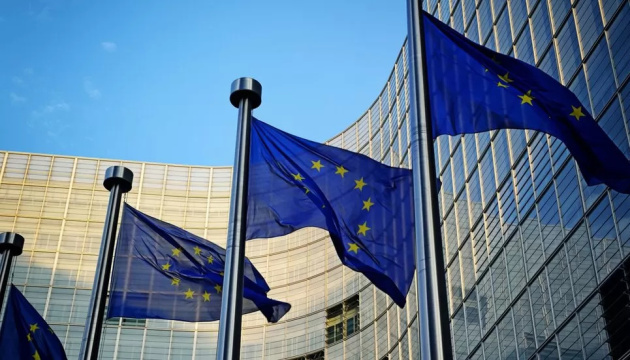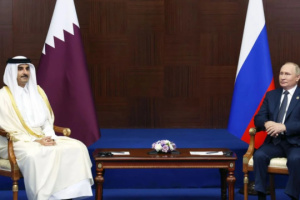
Accession to EU: European Commission posts key findings of Ukraine report
That’s according to the European Commission press service, Ukrinform reports.
"Despite Russia's full-scale invasion in February 2022 and its brutal war of aggression, Ukraine has continued to progress on democratic and rule of law reforms. The granting of candidate status for EU accession to Ukraine in June 2022 has further accelerated reform efforts," the document says.
As noted, no elections were held in Ukraine during the reporting period, although the general legal situation remains conducive to the organization of democratic elections. Framework reforms in the area of electoral law must be continued to implement outstanding recommendations by the OSCE Office for Democratic Institutions and Human Rights (ODIHR).
The work of the Ukrainian Parliament (Verkhovna Rada) is marked by extraordinary circumstances related to Russian aggression. At the same time, the parliament systematically fulfills its legislative tasks, which creates conditions for the uninterrupted preservation of the democratic decision-making process. Key decisions, especially on issues of security and defense, were taken with a clear cross-party majority. At the same time, the parliament paid considerable attention to legislation related to integration into the EU. As noted in the report, the Verkhovna Rada continues to play an important symbolic function, although there are some concerns about limited transparency on security grounds, as well as weakened oversight of the executive.
"Ukraine has some level of preparation in the area of public administration reform, with limited progress made during the reporting period. While the Ukrainian public administration has proved its resilience during the full-scale invasion, reform has slowed or stopped in a number of sectors, in particular in merit-based recruitment and selection, job classification and salary reform, as well as the roll-out of the human resources management information system," the report emphasizes.
At the same time, the European Commission notes that reforms in the field of decentralization are ongoing, with municipal bodies acting as a pillar of Ukrainian resilience. Overall, following the successful finalisation of the territorial part of decentralisation, other elements of the reform still need to be completed. Local self-government in the liberated territories and those near the frontlines should be gradually restored where the security situation allows it. The newly established Ministry of Restoration should synergise infrastructure and the regional development portfolio to stimulate locally driven recovery and reconstruction based on the systematic involvement of local authorities and associations. The local fiscal base needs to be strengthened.
The report also provides recommendations in the field of judicial reform, in particular, it notes the successful launch of the High Council of Justice and the High Qualification Commission of Judges, the reform of the Constitutional Court of Ukraine, etc.
"Since the start of the full-scale invasion, Ukraine has been confronted with an unprecedented number of atrocities committed by the Russian military. The Ukrainian institutions made considerable efforts to address this and bring the perpetrators of international crimes to justice. Multiple law enforcement agencies, following the guidance of the Office of the Prosecutor General, started investigating these complex crimes. Specialised investigation and prosecuting departments were established for this purpose. As a result, 107 951 incidents related to various atrocity crimes have been officially registered. 267 people have been indicted and 63 people convicted for war crimes by Ukrainian courts," the report reads.
As noted, international and European law enforcement agencies were involved in this work, including the ICC and its Prosecutor's Office, Eurojust, Europol, and national law enforcement agencies of EU member states.
"To improve the effectiveness of investigation of international crimes and cooperation with the International Criminal Court, Ukraine should further harmonise its legal framework with the applicable international standards," reads the report.
According to the findings of the European Commission, Ukraine has also achieved some progress in the field of fighting corruption, which concerns the creation of a broad legal anti-corruption environment and relevant structures, the gradual expansion of investigations and the prosecution of high-level corrupt officials. This work gained a new impetus after Ukraine received the status of a candidate country.
At the same time, it is noted that Ukraine has not yet returned the legal provisions on declaring assets. It should strengthen the fight against high-level corruption, including the introduction of legal norms regarding the confiscation of property of persons guilty of such crimes. In this context, Ukraine should continue the implementation of the state anti-corruption program in 2023-2025.
Ukraine should also make additional efforts to combat organized crime and eliminate legal and procedural deficiencies in this process. Ukraine is proposed to assess the threats emanating from organized crime in accordance with EU standards and to develop capabilities to combat them. In particular, the Bureau of Economic Security, which should be a key agency in the fight against economic crimes, should be staffed with quality personnel.
The report notes the successes of Ukraine in respect of human rights and in the development of democratic institutions. The measures and restrictions resulting from martial law imposed after the Russian invasion are generally proportionate and appropriate to the current situation.
"On the rights of persons belonging to national minorities, Ukraine needs to address the remaining recommendations of the Venice Commission Opinion of June 2023 and the follow-up Opinion of October 2023. Further efforts are also needed to ensure that persons with disabilities can enjoy their rights as per the UN Convention on the rights of persons with disabilities," the document emphasizes.
The report also covers other areas, including freedom of expression and media, implementation of structural reforms in the economic sphere, development of good neighborly relations and regional cooperation, and other important issues.
As reported, today the European Commission published the annual report on EU enlargement, which for the first time reflects the progress made by Ukraine, Moldova, and Georgia on their way to EU membership.




